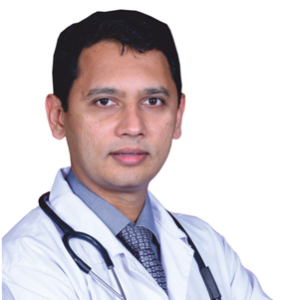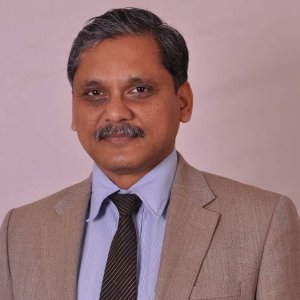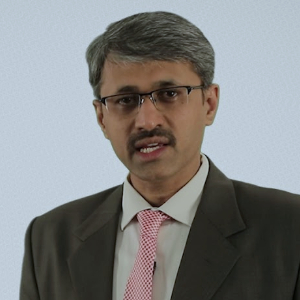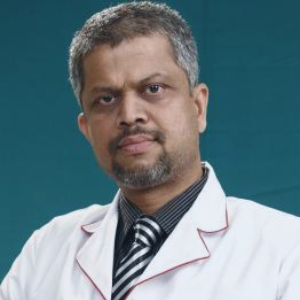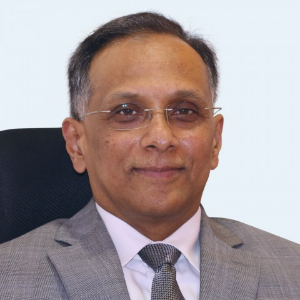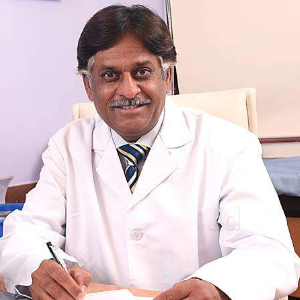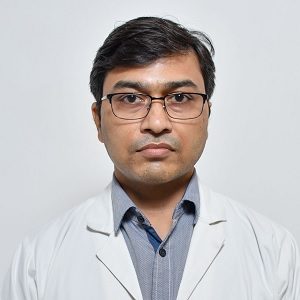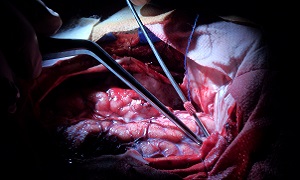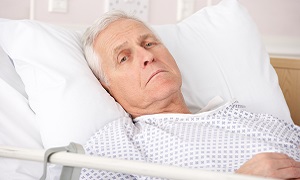Best Doctors in India for Deep Brain Stimulation
Here are the most reputed neurosurgeons in India expertised in Deep Brain Stimulation (DBS) procedure for the treatment of movement disorders like Parkinson’s disease (PD), essential tremor, dystonia, and other neurological conditions.
- Neurosurgeon, Bengaluru, India
- Over 22 years’ experience
- Gleneagles Global Hospital Bengaluru
Profile Highlights:
- Dr. Madhusudan H V is an expert Neurosurgeon in South India with 22+ years of experience in neuro and spine surgery.
- With a specialization in minimally invasive neurosurgeries, Dr. Madhusudan holds the credit for more than 7000 neurosurgeries. He also finds interest in endoscopic interventions and frameless navigations.
- Neurosurgeon & Spine Surgeon, Bengaluru, India
- Over 20 years’ experience
- Fortis Hospital Banerghatta Bengaluru
Profile Highlights:
- Dr. Prahraj S S is a leading Neurosurgeon who specializes in all types of neurological surgeries and has performed over 6000 neurosurgeries till date along with complex cranial and spine surgeries.
- He is one of the most renowned neurosurgeons in the country and has provided his services to some of the premier medical institutes in India such as NIMHANS where he performed a large number of spinal surgeries.
- Neurosurgeon & Spine Surgeon, Bengaluru, India
- Over 15 years’ experience
- Gleneagles Global Hospital Bengaluru
Profile Highlights:
- Dr. Praveen K S is a highly qualified neurosurgeon with over a decade of experience in handling all kinds of neurological diseases and disorders.
- He specializes in Pediatric Neurosurgery, Neuro-Oncology, Endoscopic neurosurgery, Aneurysms, and Neuro- Trauma and has performed over 4000 neurosurgeries in his career.
- Neurosurgeon & Spine Surgeon, Mumbai, India
- Over 20 years’ experience
- Wockhardt Hospital Mumbai
Profile Highlights:
- Dr. Rahul Modgi is a highly established neuro and spine surgeon in Mumbai specializing in all types of brain and spine surgeries.
- Dr. Rahul Modgi’s name has been recorded in the Limca Book of Records in 2014 when he removed the heaviest iron rod from the brain of a 17-year-old patient. He has also performed various other risky surgeries for which he has greatly appreciated.
- Neurosurgeon, Bengaluru, India
- Over 30 years’ experience
- Fortis Hospital Banerghatta Bengaluru
Profile Highlights:
- Dr. Rajakumar V Deshpande is a renowned Neurosurgeon in Bengaluru. He performed the first pedicle screw fixation surgery for a spine injury in Bangalore.
- Dr. D V Rajakumar specializes in endoscopic neurosurgeries and has performed some of the most complex brain and spine surgeries through the endoscopic approach. His other areas of interest include minimally invasive neuro surgeries, management of cerebrovascular diseases, and brain tumor surgeries.
- Neurosurgeon, Mumbai, India
- Over 20 years’ experience
- Gleneagles Global Hospital Parel Mumbai
Profile Highlights:
- Dr. Suresh Sankhla is an accomplished Neurosurgeon in Mumbai specializing in endoscopic neurosurgery and onco-neurosurgery.
- Dr. Sankhla acquired his training in neurosurgery under the guidance of the best trainers from well-known medical institutes and hospitals in Ireland, UK, USA as well as India.
- He has an equal interest in research and has published more than 100 articles, papers, and abstracts in renowned national and international peer-reviewed journals.
- Neurosurgeon, Gurugram, India
- Over 25 years’ experience
- Artemis Hospital, Gurgaon
Profile Highlights:
- Dr. Pawan Goyal is a renowned neurosurgeon in Gurugram with 25 years of experience.
- He gained expertise in endoscopic neurosurgery, minimally invasive spine and neurosurgery, all brain and spine tumors, head and spine injuries.
Best Hospitals in India for Deep Brain Stimulation
Hospital Highlights:
- Apollo Hospitals is a private healthcare group in India, with its headquarters based in Chennai. Established in 1983 by Dr. Prathap C. Reddy, the group offers a wide range of medical treatments and services across various specialties.
- It is renowned for emphasizing innovation and utilizing cutting-edge medical technologies into patient treatment.
- Known as India’s first corporate hospital, Apollo Hospitals is often credited for pioneering the private healthcare revolution in the country.
- With clinics and hospitals located all throughout India, Apollo Hospitals is a nationwide healthcare organization. Its presence can also be found in foreign countries.
- Preventive health examinations, medical and surgical treatment, and diagnostic centres are just a few of the services that the Apollo group provides.
- The group has several centres of expertise, including Cardiac Sciences, Neurosciences, Orthopedics, Emergency Care, Cancer Care, and Organ Transplantation.
- City: Chennai, India
Hospital Highlights:
- RIMC is a multi-specialty hospital in a sprawling area of 36 acres located in Chromepet, Chennai, Tamil Nadu, India.
- The facility has 450 beds including 130 critical care beds, 9 operating rooms, modern reference laboratories and radiology services, and is conveniently located near road, rail and air transportation.
- RIMC is led and managed by world-renowned physicians committed to healthcare.
- RIMC offers the broadest range of clinical care, education, and research. The hospital offers state-of-the-art technology and modern treatment facilities designed to provide health care at an affordable cost.
- Rela Institute is driven by patient needs, comfort and confidence.
- City: New Delhi, India
Hospital Highlights:
- Fortis Hospital in Shalimar Bagh is a multi-super specialty hospital that strives to provide world-class patient care by leaving no stone unturned.
- Fortis, Shalimar Bagh, with 262 beds and a 7.34-acre footprint, provides the best level of medical care through its team of doctors, nurses, technicians, and management professionals.
- City: Bengaluru, India
Hospital Highlights:
- Established in 2007, the Apollo Hospitals Bangalore is a 300-bed multispecialty hospital situated in Bannerghatta Road, Bangalore.
- Equipped with the state-of-the-art technology, it is a leading hospital dedicated to providing healthcare needs to patients with compassion and expertise.
- It is the first hospital to have completed the highest number of Robot Assisted Heart Surgeries in India.
- Over the years, it has successfully conducted some of the rarest medical procedures such as spinal angiolipoma excision, autologous chondrocyte implantations, and tibial tuberosity shift with MPSL reconstruction.
- The Apollo Hospitals Bangalore has the reputation of performing the greatest series of airway stents in the country.
- Additionally, the hospital is known for providing comprehensive treatment in specialties such as gastroenterology, urology, gynecology, oncology, colorectal surgery, etc.
- The “The Minimal Access Surgery Centre” (MASC), one of Apollo Hospitals, Bangalore’s premier Centres of Excellence, is devoted to the use of minimally invasive surgical procedures.
- In 2013, THE WEEK-A C Nielsen, Best Hospital Survey ranked Apollo Hospitals Bangalore as the 2nd best multi-speciality hospital in Bangalore.
- City: Mumbai, India
Hospital Highlights:
- Gleneagles Global Hospital The 450-bed facility comprises of 17-stories, housing state-of-the-art infrastructure, and advanced medical care facilities.
- The hospital offers end-to-end clinical, surgical, and diagnostic services. It is equipped with a team of eminent medical professionals aided by qualified nurses and medical staff
- The Hospital offers advanced Endoscopic procedures, Hepatobiliary and Liver Surgeries, Surgical and Medical Gastroenterology, Bariatric Surgery, and Robotic surgery.
- The hospital is a center of excellence for Orthopedics, Joint Replacement, Knee Replacement, and Hip Replacement surgery.
- City: Hyderabad, India
Hospital Highlights:
- CARE Hospitals were established in the year 2000, by CARE Group.
- The multispecialty hospital has 435 beds, including 120 critical care beds, with an annual inflow of 180000 outpatients and 16,000 in-patients.
- The hospital provides specialty medical services in Cardiology, Cardiothoracic Surgery, Pediatric Cardiology, Pediatric Cardiothoracic Surgery, Neurology, Neurosurgery, Nephrology, and Urology.
- The hospital has the first dual source, 128 slice CT scanner (for high precision cardiac imaging) – the first of its kind in south India.
- The hospital offers a wide range of accommodation facilities for the convenience of its varied patient base, ranging from general wards to super deluxe rooms.
- City: Mumbai, India
Hospital Highlights:
- Fortis Hospital in Mulund is a 315-bed multi-speciality tertiary care hospital with five JCI accreditations that offers a wide variety of diagnostic and treatment services. The Fortis Hospital in Mulund delivers patient-centred treatment with cutting-edge technology, highly skilled and experienced surgeons, and paramedical staff.
- This institution houses Maharashtra’s largest multi-organ transplant centre. It is also the first heart transplant centre in western India to conduct 100 or more consecutive heart transplants in under four years. It is the only hospital in the city to have multi-organ transplants and has handled the youngest patient for angioplasty. Fortis Hospital Mulund now boasts the first advanced surgical robot in central Mumbai.
- Cardiology and heart surgery, urology, nephrology, neurosciences, orthopaedics, digestive care, emergency and critical care, and maternity care are among the services provided by the hospital.
- City: New Delhi, India
Hospital Highlights:
- Manipal Hospitals, Dwarka, is a super-specialty hospital in Dwarka, New Delhi, which is a part of Manipal Hospitals Group.
- The hospital aims to provide the best treatment on par with international standards at a fraction of the cost.
- Equipped with 380 beds, the hospital is also one of the new age hospitals which are equipped fully with state-of-the-art infrastructure, cutting-edge technology as well as the latest and advanced clinical practices. The hospital also has 13 modular Operation theatres with 118 beds which are solely meant for critical care.
- The hospital comprises internationally acclaimed doctors and highly professional and experienced hospital and medical staff who are able to provide preventive, therapeutic, and diagnostic services all under one roof.
- City: Chennai, India
Hospital Highlights:
- Located in Chennai, India, MGM Healthcare is a top multispecialty hospital that provides all medical services under one roof.
- Since its founding in 2019, MGM Healthcare has quickly become a leading national referral centre, creating several innovative flagship initiatives.
- MGM Healthcare combines next-generation medical and digital technologies to provide better patient results.
- With 12 centres of excellence, more than 400 inpatient beds, 100 intensive care unit beds, and 24/7 emergency care, MGM Healthcare leaves no chance in redefining the patient experience in Chennai.
- MGM Healthcare boasts 250+ expert doctors across 30+ departments, including Cardiology, Pulmonology, Neurology, Obstetrics & Gynaecology, and more.
- They house 12 specialized Centres of Excellence, including Neurosciences, Orthopaedics, and Multi-Organ Transplantation.
- Their team of doctors, nurses, and paramedics works together to give every patient individualized treatment.
Hospital Highlights:
- Lilavati Hospital & Research Centre is India’s premier multi-speciality tertiary care hospital and has been recognised as a global medical excellence centre.
- Lilavati Hospital & Research Centre has built an unrivalled level of trust with its patients over the years, thanks to a solid foundation that comprises cutting-edge facilities, the best medical competence, research, education, and charity endeavours.
- The hospital is quite proud of the fact that it now serves patients from all kinds of backgrounds, not just from the United States but from all around the world.
- The hospital has a total of 323 beds, one of the largest Intensive Care Units (ICUs), 12 Operation Theatres with modern amenities, over 300 consultants, and almost 1,800 personnel.
Deep Brain Stimulation
Deep brain stimulation is an elective surgical procedure, which involves implanting electrodes in certain areas of the brain. These electrodes or leads help in generating electrical impulses for controlling any abnormal activity in the brain. The electrical impulses can also adjust for any chemical imbalance within the brain which can lead to various conditions. A programmable generator resembling a pacemaker placed under the skin in the upper chest controls the stimulation of brain areas.
Deep brain stimulation has been approved for treating several conditions which include dystonia, epilepsy, essential tremor, Parkinson’s disease, and obsessive-compulsive disorder. Currently, it is also being studied as a potential treatment for addiction, chronic pain, cluster headache, dementia, depression, stroke recovery, multiple sclerosis, Huntington’s disease, Tourette syndrome as well as traumatic brain injury.
Purpose
Deep brain stimulation is an established treatment for people who are suffering from movement disorders, which can include essential tremor. Parkinson’s disease and dystonia, and psychiatric conditions such as OCD are few other ailments which can be treated by this procedure.
This treatment is reserved for the people who are unable to control their symptoms with the use of medications.
Preparation
Since deep brain stimulation is a serious as well as a risky procedure you need to weigh the pros and cons carefully, along with your doctor, even if you are considered eligible for the procedure.
Before the surgery, you will require a few medical tests for making sure that deep brain stimulation is safe and appropriate for you. You will also require brain-imaging studies such as an MRI, before your surgery to map the areas of your brain to implant the electrodes.
Procedure
The surgery for deep brain stimulation has two portions.
Brain surgery
For the brain surgery portion, the surgery team will fit you with a special head frame so that your head is still during the procedure. Then, team members will use magnetic resonance imaging (MRI) in order to map your brain. This will allow them to identify the areas in your brain where they will need to place the electrodes.
The surgery can be performed under general anesthesia or local anesthesia. If local anesthesia is used, it will numb your scalp before the procedure. However, you will not need an anesthetic inside your brain as it has no pain receptors.
Your surgeon will be implanting a thin wire lead with a number of contacts or electrodes at the tips into a specific area in your brain. He/she might also implant one lead into each side of your brain. Then a wire will run under your skin to a pulse generator which will be implanted near your collarbone.
During the surgery, your brain will need to be closely monitored by the surgeon and the neurologist, to help ensure correct electrode placement.
Chest wall surgery
During the second portion of your surgery, the surgeon will implant the part of the device containing the batteries under your chest’s skin, near the collarbone. During this procedure, general anesthesia will be used. Wires from your brain electrodes will be placed under your skin. They will then be guided down to the battery-operated pulse generator. This generator will be programmed to send continuous electrical pulses to the brain. You will be controlling the generator and you are also able to turn it off using a remote control.
After the procedure
The pulse generator in your chest will be activated in your doctor’s office a few weeks after your surgery takes place. Using a special remote control, the doctor will easily be able to program your pulse generator from outside your body. The amount of stimulation will then be customized to match your condition. Finding the optimal setting can take a few hours.
Depending on your condition, your doctor will advise you whether you need stimulation constantly running 24 hours a day, or you need to turn off the pulse generator at night before sleeping. The special remote control which you will receive from your doctor can help you turn the stimulation on and off. Your doctor may also program the pulse generator to let you make any minor adjustments at home.
Your generator’s battery life can vary with usage and settings. When your battery needs replacement, your surgeon will replace the generator during an outpatient procedure.
It is important to note that this procedure will not be curing your disease, but it can provide help in lessening your symptoms to a great extent. If this procedure works, your symptoms will be improving significantly. However they don’t go away completely and in some cases, you might still need medications for certain conditions. It is also noteworthy that this procedure isn’t successful for anyone. Before your surgery, it is important to talk with your doctor regarding the benefits, risks, and expectations.
Advantages
This procedure can be performed on either side of your brain, depending on your symptoms. For each patient’s clinical status, the effects can be customized individually for each patient’s clinical status.
The device can help to provide continuous symptom control 24 hours a day. If one sees side effects, stimulation settings can be modified to diminish them.
Risks
Deep brain stimulation is a minimally invasive surgery and is generally considered safe. However, like any other surgery, it has a risk of a few complications.
The first surgery involves creating small holes in the skull for implanting the electrodes, and the second surgery involves implanting the device with batteries under the skin in the chest.
Complications of surgery might include:
- Misplacement of lead
- Stroke
- Infection
- Bleeding in the brain
- Breathing problems
- Heart problems
- Seizure
- Nausea
Side effects that are associated with deep brain stimulation include seizure, infection, headache, difficulty in concentration, temporary pain and swelling at the implantation site, etc.
The device will be turned on a few weeks after your surgery, and the process of finding the best settings will begin. Though some of the settings can cause side effects, most of them can improve with further adjustment of the device.

